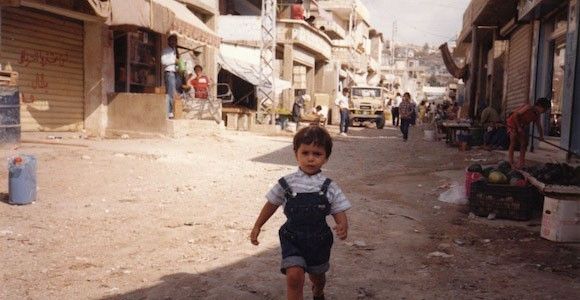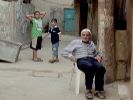Eye For Film >> Movies >> A World Not Ours (2012) Film Review
A World Not Ours
Reviewed by: Amber Wilkinson

The Ain el-Heweh refuguee camp in Lebanon was set up in 1948 to house displaced Palestinians, then a space full of pitched tents that people assumed would be a temporary home. In 2013, this one square kilometre (around 0.6sqm) of land is home to 70,000 people, who live on top of one another in buildings housing multiple family members.
Residents are able to come and go as they please - via checkpoints - into Lebanon but are barred from taking on work of any significance in the country as they are not 'citizens'. Mahdi Fleifel's documentary takes us deep into the camp and offers an intensely personal perspective on the things about this community that he loves, while also capturing the long-term affect that being in this state of 'settled' limbo has on its original residents and the generations who have come after.

All the while, Fleifel probes a quote from former Israeli president David Ben-Gurion - who made the declaration of Israeli independence in the same year the camp was founded - which, in reference to the displaced refugees from Palestine said: "The old will die and the young will forget."
Fleifel could be classed as one of the young, having spent part of his life in the camp, living there before his family moved to Dubai when he was five. They returned for another chunk of time before moving out for good after his dad got a job in Denmark. Still, he returned during summers - which he describes as "better than going to Disney" - and particularly loved the four-yearly arrival of the World Cup when, for a month, sides are picked and support given and "everyone has a state".
Fleifel's father was a fan of video cameras, so there is a wealth of footage from his youth and he talks about returning (and fleeing) in summer 2006 after the sight of bombs falling as part of the Lebanon/Israel 34-day conflict made him realise, "I just didn't have the guts to hang out in a war zone".
Returning again in 2010, he sets about documenting the, mostly male, members of his family and extended family and friends, showing that while the old may, indeed, die in the camp they've lived in most of their adult lives - forgetting is going to be tough for those still trapped. Like the homing pigeons owned by Fleifel's Uncle Said, they may be able to fly where they want but they can never truly leave.
Of course, not everyone wants to. Fleifel's grandfather, for example, who is a sort of grumpy elder statesman in his life - "I swear you foreigners are lazy," he scolds the director when he refuses to kill a cockroach. He has no intention of leaving the camp and is determined to secure his "right to return". The younger men are not so sure. Said, who has little time for anything except fooling around and looking after his pigeons, seems to be doing little more than marking time. Meanwhile, Fleifel's best pal in the camp Abu Eyad - a member of PLO sub-group Fatah since he was seven - is beginning to question the cause that brings him little except enough cash to keep him in basics and cigarettes. He has no particular desire "to return" but this documentary asks, how on earth can he move on? "I wish Israel would massacre us all," he says.
Fleifel captures life in Ain el-Heweh. There is commerce in the camp but many of the men simply hang about, shooting the breeze - guns almost always in evidence. He also shows footage of women marrying men who have residency in Europe, a point that is not laboured but which suggests that the demographic is probably becoming increasingly skewed and adding to the younger males' sense of futility.
This is a portrait of an environment where the community may be strong but it is hard to thrive. Given the number of refugees currently flooding hotspots such as Syria and parts of Africa, it also raises bigger questions about the nature of these sorts of camps in general. Is it right to keep people 'safe' on some level but yet deny them basic rights such as a productive life that so many of us take for granted? Is it surprising that so many of them take the dangerous illegal immigrant route instead in search of something more? Forgetting Ain El-Heweh seems to be something the rest of the world has become good act, Fleifel's heart-felt film is a powerful reminder.
Reviewed on: 21 Jun 2013















